2017 SkS Weekly Climate Change & Global Warming Digest #8
Posted on 26 February 2017 by John Hartz
Story of the Week... Toon of the Week... Quote of the Week... Graphic of the Week... SkS in the News... Photo of the Week... SkS Spotlights... Video of the Week... Coming Soon on SkS... Poster of the Week... Climate Feedback Reviews... Audio of the Week... SkS Week in Review... 97 Hours of Consensus...
Story of the Week...
Major U.S. science groups endorse March for Science
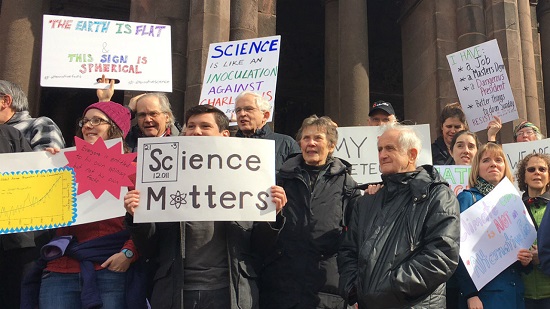
Demonstrators rally for science near the AAAS annual meeting in Boston in February.
The March for Science, set for 22 April, is creating a buzz in the scientific community. The march arose as a grassroots reaction to concerns about the conduct of science under President Donald Trump. And it has spurred debate over whether it will help boost public support for research, or make scientists look like another special interest group, adding to political polarization.
Leaders of many scientific societies have been mulling whether to formally endorse or take a role in the event. And today, some major groups—including AAAS (publisher of ScienceInsider), which has about 100,000 members, and the American Geophysical Union (AGU), which has about 60,000 members—announced they are signing on. The two organizations were on a list of 25 formal partners unveiled by the March for Science.
“We see the activities collectively known as the March as a unique opportunity to communicate the importance, value and beauty of science,” AAAS CEO Rush Holt wrote in a statement on the website of the Washington, D.C.–based organization, which bills itself as the largest general science society in the world. Participation “is in keeping with AAAS’ long-standing mission to ‘advance science, engineering and innovation throughout the world for the benefit of all people.'”
Updated: Major U.S. science groups endorse March for Science by Lindzi Wessel, Science (AAAS), Feb 23, 2017
Toon of the Week...
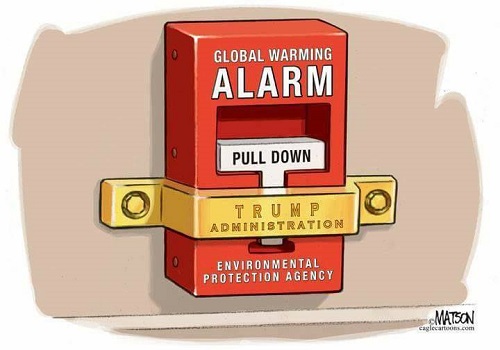
Quote of the Week...
Chris Field, director of the Stanford Woods Institute for the Environment, said the philosophical perspective on climate change is crucial for approaching the problem in an efficient way.
“As natural scientists, we know a lot about what controls the climate and what kind of impacts we’re likely to see in the future,” said Field, a professor of biology and of Earth system science and a member of Francis’ dissertation committee. “But increasingly the important questions are human ones. What will people decide is important regarding climate change? Natural science can’t speak to those issues and philosophy can.”
Stanford researcher examines moral significance of actions causing climate change by Alex Shashkevich, Stanford News, Feb 23, 2017
Graphic of the Week...
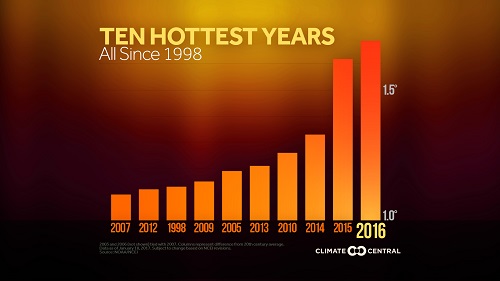
10 Hottest Years on Record, Climate Central, Feb 16, 2017
SkS in the News...
Amber Sullivan, Chief Meterologoist for ABC 15 Arizona tweeted Great FREE app for your phone by @skepticscience! Check it out: #abc15wx #azwx #climate #climatematters.
In his Media Matters fof America article, Michael Savage Says He Spent “Over An Hour Alone” With Trump And Urged Him To Continue Denying Human-Caused Climate Change, Eric Hananoki references and links to the SkS rebuttal article, What does past climate change tell us about global warming?
While the ice ages Savage referenced — as well as historical warm periods — did occur due to natural causes, Skeptical Science and others have debunked the ice ages argument and explained that today’s climate change can be explained only by human activity. An overwhelming majority of climate scientists have concluded that human activities are the primary cause of climate change.
Tim DiChristopher of CNBC includes the followng in his post, Murray Energy CEO claims global warming is a hoax, says 4,000 scientists tell him so.
Murray's claim that there is no scientific analysis behind climate change is not true.
A landmark 2013 study assessed 4,000 peer-reviewed papers by 10,000 climate scientists that gave an opinion on the cause of climate change. It showed 97 percent of the authors attributed climate change to manmade causes.
The "landmark 2013 study" is Quantifying the consensus on anthropogenic global warming in the scientific literature, John Cook et al, Environmental Research Letters (ERL), Volume 8, Number 2, May 15, 2013
Photo of the Week
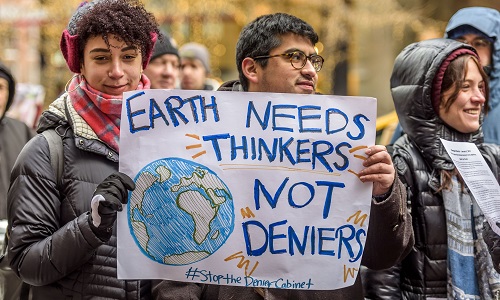
‘The administration’s disdain towards climate science has prompted some climatologists to consider leaving the profession.’ Photograph: Rex/Shutterstock
Climate scientists face harassment, threats and fears of 'McCarthyist attacks' by Oliver Milman, Guardian, Feb 22, 2017
SkS Spotlights...
The Centre for Science Communication at the University of Otago, New Zealand is excited to announce the launch of a new distance (online) degree for its Postgraduate Certificate in Science Communication in Creative Nonfiction Writing, with applications now being accepted for 2017. This two-semester (one-year) certificate programme, consisting of two taught papers (courses) and a professional internship, is ideal for aspiring nonfiction writers wishing to develop their existing skill set while learning about the science-writing industry. As a distance student with full access to the University of Otago's electronic library resources, you'll acquire invaluable tricks of the trade, receive editorial feedback on your written work, and become part of a supportive online science writers community, giving you the competitive edge in becoming a successful communicator in this rapidly growing field. Courses are taught and led by the Centre’s accomplished staff: Jesse Bering (essayist for Scientific American, Slate, and many others and the author of such high-profile books as PERV, a New York Times Editors’ Choice, the critically acclaimed Why is the Penis Shaped like That? And Other Reflections on Being Human, and The Belief Instinct: The Psychology of Souls, Destiny and the Meaning of Life, named one of the 25 Best Books of the Year by the American Library Association) and Lloyd Spencer Davis (author of the New Zealand Children’s Book of the Year The Plight of the Penguin and the award-winning Looking for Darwin). For further information about the Postgraduate Certificate in Science Communication in Creative Nonfiction Writing, including instructions on how to apply for the new distance degree option, please visit the following link http://www.otago.ac.nz/study/enrolment/ or email sciencecommunication@otago.ac.nz.
Video of the Week...
Response to "DEBUNKED: Top 5 "Climate Change" Myths" by Louder with Crowder by Potholer54, YouTube, Sep 12, 2016
Coming Soon on SkS...
- 300 fake experts tell Trump to let the climate burn (John Abraham)
- Dear Mr. President: another message from across the pond (John Mason)
- When Republicans accept a carbon tax, how high should it be? (Dana)
- Electric Cars are the Missing Link to a Zero Carbon Energy Grid (Ryan Logtenberg)
- Climate Bet for Charity, 2017 update (Rob Honeycutt)
- 2017 SkS Weekly Climate Change & Global Warming News Roundup #9 (John Hartz)
- 2017 SkS Weekly Climate Change & Global Waming Digest #9 (John Hartz)
Poster of the Week...
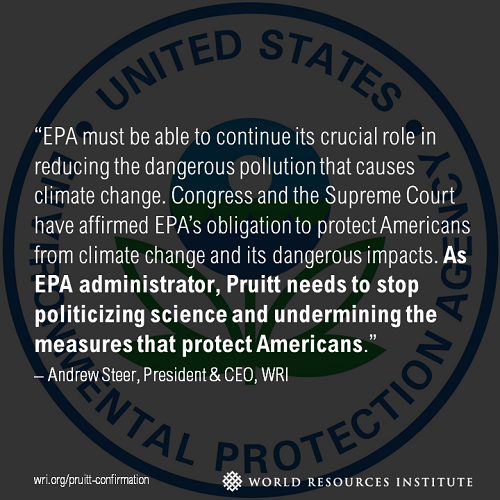
Climate Feedback Reviews...
Climate Feedback asked its network of scientists to review the article, Scientists have just detected a major change to the Earth’s oceans linked to a warming climate by Chris Mooney, Energy & Environment, Washington Post, Feb 15, 2017.
Six scientists analyzed the article and estimated its overall scientific credibility to be ‘very high’. A majority of reviewers tagged the article as: Accurate, Insightful.
Click here to access the detailed review.
Audio of the Week...
Audio: Naomi Oreskes on what stories we can’t let get lost in the noise of 2017 and why scientists should speak up by Mike Gaworecki, Mongabay, Feb 21, 2017
Normally we’re focused on international conservation and environmental science news here at the Mongabay Newscast, just as our reporting on Mongabay.com is. But because there’s so much uncertainty around the new Trump Administration, especially its energy, environment, and climate policies, we decided to dedicate this episode to trying to answer some of those questions.
We’ve assembled quite a distinguished panel of experts to discuss what we can and can’t say about the Trump Administration’s plans. On this episode of the Mongabay Newscast, we first welcome Harvard professor, climate historian, and noted author Naomi Oreskes to talk about what stories she’s worried will get lost in the media’s hyperfocus on the chaos surrounding the new Trump Administration in the U.S. as well as her recent lecture at the annual meeting of the American Association for the Advancement of Science in which she laid out an evidence-based case for why scientists should be speaking out about their work in public.
Oreskes has been Professor of the History of Science and Affiliated Professor of Earth and Planetary Sciences at Harvard University since 2013. Her research focuses on the Earth and environmental sciences, with a particular interest in understanding scientific consensus and dissent. Her 2010 book, Merchants of Doubt, How a Handful of Scientists Obscured the Truth on Issues from Tobacco to Global warming, co-authored with Erik M. Conway, was shortlisted for the Los Angeles Times Book Prize and received the 2011 Watson-Davis Prize from the History of Science Society. It was also made into a documentary of the same name.
We continue to take a look at what this year will bring for energy and the environment under President Trump with Bobby Magill, a senior science writer for Climate Central and the president of the Society of Environmental Journalists, which recently released a special backgrounder entitled “Turbulent Prospects on Environment-Energy Beat Likely in Trump Era.”
And we also welcome a third guest to the show, Jeff Ruch, executive director of the non-profit service organization Public Employees for Environmental Responsibility. Jeff shares with us what he’s been hearing so far from employees of the Environmental Protection Agency about their concerns with the Trump Administration’s environmental policies.
Click here to access the entire article and audio.
SkS Week in Review...
- 2017 SkS Weekly Climate Change & Global Warming News Roundup #8 by John Hartz
- OMG measurements of Greenland give us a glimpse of future sea rise by John Abraham (Climate Consensus - the 97%, Guardian)
- As EPA head, Scott Pruitt must act on climate change by Kelly Fleming, Jane Zelikova & Sarah Myhre (Seattle Times)
- Trump can save his presidency with a great deal to save the climate by Dana Nuccitelli (Climate Consensus - the 97%, Guardian)
- Climate Change – What We Knew and When We Knew It by greenman360 (Yale Climate Connections)
- Expect to see more emergencies like Oroville Dam in a hotter world by Dana Nuccitelli (Climate Consensus - the 97%, Guardian)
- 2017 SkS Weekly Climate Change & Global Warming Digest #7 by John Hartz
97 Hours of Consensus...
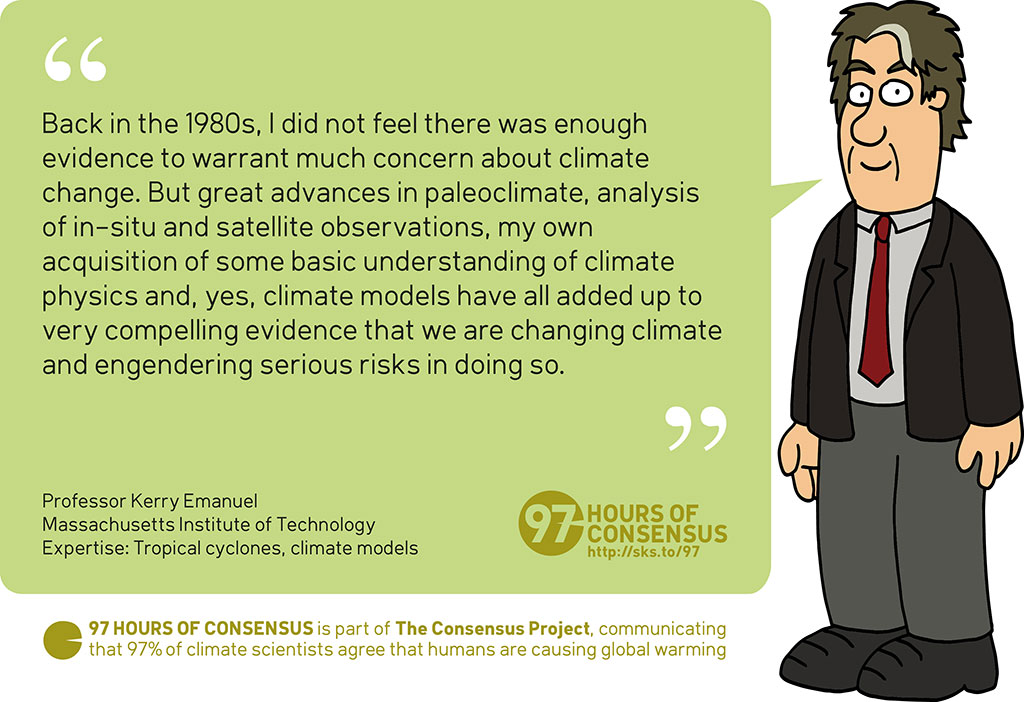































 Arguments
Arguments






























Comments